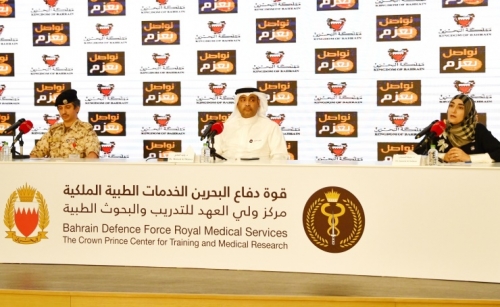The National Medical Taskforce for Combating the Coronavirus (COVID-19) highlights measures taken to mitigate the spread of COVID-19
The National Taskforce for Combating the Coronavirus (COVID-19) today held a press conference at the Crown Prince Centre for Training and Medical Research at the Bahrain Defence Force Hospital, to highlight measures taken to mitigate the spread of COVID-19.
Dr. Waleed Khalifa Al Manea, Undersecretary at the Ministry of Health and member of the National Taskforce for Combating the Coronavirus (COVID-19), began by highlighting the significant milestone of conducting over 1 million COVID-19 PCR diagnostic tests, which was achieved as part of Bahrain’s ‘Trace, Test, Treat’ strategy.
Al Manea further highlighted this strategy has resulted in Bahrain conducting 707 tests per 1,000 people, one of the highest rates in the world.
Dr. Al Manea noted that, alongside testing and treatment, the Ministry of Health continues to welcome volunteers for the phase III clinical trial for a COVID-19 inactivated vaccine, in collaboration with G42 Healthcare, an artificial intelligence company based in the United Arab Emirates (UAE).
Turning to patient outcome, Dr. Al Manea explained that the recovery rate is currently at 93.2% with a 0.4% death rate. Isolation centre capacity stands at 19.5%, with 1,589 out of 8,158 beds occupied, and 1,383 asymptomatic cases are under optional home self-isolation after meeting the set criteria.
Dr. Al Manea reaffirmed that the Task Force is assiduously monitoring data on health systems and COVID-19 policy responses to ensure their effectiveness, and asked citizens and residents to comply with precautionary measures during Ashura to limit the spread of the virus.
Lt. Col. Dr. Ahmed Mohammed Al Ansari, Project Manager of Public Hospital Autonomy at the Supreme Council of Health, then reviewed COVID-19 indicators as:
1. The doubling time, the time that it takes for twice as many people to become infected with the virus, for total cases stood at 42-days until 31 July, with no doubling occurring during the past 25 days to date
2. The doubling time between Bahrainis stood at 25 days on 8 July, with no doubling occurring during the past 48 days
3. The doubling time between expatriates stood at 34 days on 4 July, with no doubling occurring during the past 48 days
4. The ratio of new to recovered cases stood at 0.7 and 1.6 during 10 August to 24 August, in comparison to 0.5 and 1.6 between 26 July and 9 August
5. The average percentage of positive tests in the period between August 10 to 24 ranged between 3.0% to 4.4%, compared to 3.5% to 5.2% for the period 26 July to 9 August
6. The basic reproductive ratio for the period between August 10 and 24 was between 1.5 and 1.9, compared to 1.4 and 1.8 between 26 July and 9 August. A ratio of 1 is necessary in order for Bahrain to successfully overcome all COVID-19 challenges.
Dr. Jameela Al Salman, Consultant of Infectious and Internal Diseases at Salmaniya Medical Complex and member of the National Medical Taskforce for Combating the Coronavirus (COVID-19), highlighted the different types of vaccines as follows:
• mRNA vaccines: A new technology that is not widely used in vaccines, it works by developing nucleic acids that are genetically engineered in laboratories to stimulate cells to form proteins similar to those from COVID-19 in order to generate an immune response
• Live attenuated (LAV): LAV vaccines use an attenuated form of the virus to create a strong and long-lasting immune response.
• Inactivated vaccine: A method that relies on a killed version of the virus. This is the most widely used and safest method of vaccination
Dr. Al Salman underlined the vaccination used in Bahrain as part of the clinical trials is an inactivated one. Speaking about the vaccination process, Al Salman stressed that it starts with a medical screening to determine eligibility. Eligible candidates will then receive two-doses, 3 weeks apart, and will be closely monitored throughout.
Dr. Al Salman reviewed the health status of active cases, confirming 3,185 stable cases from a total of 3,217 active cases. Currently, 63 COVID-19 cases are receiving treatment, of which 32 are in a critical condition. Dr. Al Salman noted that 1,058,000 tests have been conducted to date.
Related Posts

